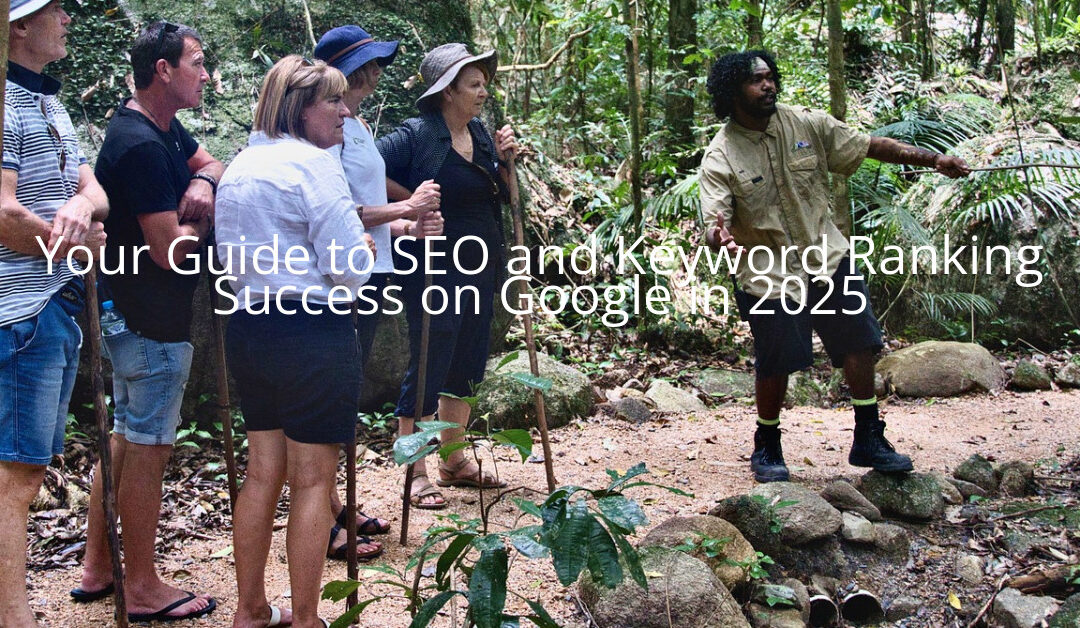Your Guide to SEO and Keyword Ranking Success on Google in 2025
 There’s a certain rhythm to the internet, much like the ebb and flow of the tides. One moment your content is basking in the spotlight, ranking at the top of Google’s search results, and the next, it’s buried beneath a sea of competitors. As we inch closer to 2025, this dance with Google’s algorithms is more intricate than ever. The question remains: How do you ensure your content stays afloat, riding the waves of SEO success rather than sinking to obscurity?
There’s a certain rhythm to the internet, much like the ebb and flow of the tides. One moment your content is basking in the spotlight, ranking at the top of Google’s search results, and the next, it’s buried beneath a sea of competitors. As we inch closer to 2025, this dance with Google’s algorithms is more intricate than ever. The question remains: How do you ensure your content stays afloat, riding the waves of SEO success rather than sinking to obscurity?
If you’ve found yourself asking what’s changed in the world of SEO, or how you can adapt to the ever-shifting rules of the game, you’re not alone. With Google making countless updates to its algorithm each year and the rise of AI-driven search engines, 2025 will be a pivotal year for content creators. But the core of the game remains the same: keywords, relevance, and strategy. To win, you’ll need to master the art of keyword ranking and stay ahead of the competition.
Let’s dive into the strategies that will keep your SEO efforts on the cutting edge, and how you can ensure your content stands tall in Google’s search results.
Related: From Spend to Success: How to Make Paid Content Promotion Deliver Results
1. Embrace the Evolution of Keywords
 Gone are the days when SEO success meant sprinkling a few carefully chosen keywords across your blog post and watching it soar to the top of Google. In 2025, keywords are still the foundation, but the way we approach them has evolved.
Gone are the days when SEO success meant sprinkling a few carefully chosen keywords across your blog post and watching it soar to the top of Google. In 2025, keywords are still the foundation, but the way we approach them has evolved.
Today, it’s not just about finding high-volume keywords; it’s about understanding search intent. When users type in a search query, what are they really looking for? Are they seeking information, a product, a comparison, or perhaps a quick answer? Google’s algorithms have become adept at recognizing these subtleties, and to rank well, your content needs to satisfy the exact intent behind the search.
For example, if someone searches “best SEO tools 2025,” they likely want a detailed comparison, not just a product list. Your content should reflect that intent—offering in-depth reviews, pros and cons, and expert recommendations to answer all of their questions. In this way, content optimization is no longer just a numbers game. It’s a nuanced dance between addressing your audience’s needs and Google’s expectations.
2. The Power of Long-Tail Keywords
 In the crowded world of SEO, long-tail keywords are your secret weapon. While short, competitive keywords are like trying to win a race against a hundred marathon runners, long-tail keywords are more like competing in a local 5K. They’re more specific, less competitive, and often lead to higher conversions because they target users who know exactly what they’re looking for.
In the crowded world of SEO, long-tail keywords are your secret weapon. While short, competitive keywords are like trying to win a race against a hundred marathon runners, long-tail keywords are more like competing in a local 5K. They’re more specific, less competitive, and often lead to higher conversions because they target users who know exactly what they’re looking for.
For instance, instead of targeting “SEO tips,” try focusing on “SEO tips for small businesses in 2025” or “best free SEO tools for bloggers.” These phrases might not have the massive search volume of more generic terms, but they bring in highly targeted traffic—visitors who are more likely to engage with your content and convert into loyal customers.
The key here is to focus on quality over quantity. While long-tail keywords may generate less traffic overall, the traffic they do attract is far more relevant, which can lead to better engagement metrics—something Google loves to see.
3. Optimize for Voice Search and Conversational Queries
 If you’re not optimizing for voice search, you’re missing out on a significant chunk of SEO potential. By 2025, voice searches are expected to account for nearly half of all online searches, with users relying on virtual assistants like Siri, Alexa, and Google Assistant to find the information they need.
If you’re not optimizing for voice search, you’re missing out on a significant chunk of SEO potential. By 2025, voice searches are expected to account for nearly half of all online searches, with users relying on virtual assistants like Siri, Alexa, and Google Assistant to find the information they need.
Voice search queries tend to be longer and more conversational than traditional text searches. Instead of typing “best pizza near me,” users are more likely to ask, “What’s the best pizza place around here?” This shift requires content creators to optimize for natural language and conversational queries. Including question-based keywords and phrasing content in a way that mimics how people speak can help you capture more voice search traffic.
For instance, including FAQ sections or crafting blog posts that address specific questions can improve your chances of ranking for voice searches. And with Google placing more emphasis on featured snippets—those short, concise answers that appear at the top of search results—there’s a golden opportunity for brands to claim prime real estate in the voice search landscape.
4. User Experience: Google’s Silent Judge
 In 2025, SEO is not just about content—it’s about the experience your site provides. Google has made it clear that user experience (UX) plays a pivotal role in rankings. Core Web Vitals, page speed, mobile-friendliness, and overall site usability are all key factors that influence where your content lands in the search results.
In 2025, SEO is not just about content—it’s about the experience your site provides. Google has made it clear that user experience (UX) plays a pivotal role in rankings. Core Web Vitals, page speed, mobile-friendliness, and overall site usability are all key factors that influence where your content lands in the search results.
Imagine visiting a website that takes forever to load, is impossible to navigate on a phone, or bombards you with pop-ups. Would you stick around? Probably not—and Google knows it. Pages that load slowly or offer poor user experiences are penalized in the rankings, while those that prioritize speed, clarity, and mobile optimization are rewarded.
To succeed in 2025, ensure your site is mobile-responsive, quick to load, and easy to navigate. And don’t underestimate the power of a clean, intuitive design. When users spend more time on your site, engage with your content, and explore other pages, it sends positive signals to Google, boosting your SEO.
5. AI and Machine Learning: The Future of SEO
 Artificial intelligence (AI) and machine learning are transforming how search engines evaluate content. In 2025, Google’s RankBrain and other AI-driven algorithms are more sophisticated than ever, learning from user behavior to better understand search intent and context.
Artificial intelligence (AI) and machine learning are transforming how search engines evaluate content. In 2025, Google’s RankBrain and other AI-driven algorithms are more sophisticated than ever, learning from user behavior to better understand search intent and context.
What does this mean for your SEO strategy? It means creating content that isn’t just relevant but adaptive and intuitive. Focus on producing high-quality, authoritative content that answers questions clearly, provides value, and keeps users engaged. AI can also help you analyze user data, adjust keyword strategies, and predict trends, giving you a competitive edge in a rapidly changing digital landscape.
Conclusion: Navigating the Tides of SEO in 2025
Picture the glow of a lantern guiding ships through the fog along Portugal’s rocky coastline. Just as that light leads the way, a well-crafted SEO strategy is your beacon in the ever-changing digital landscape, illuminating the path to success amidst shifting algorithms and fierce competition.
In 2025, SEO isn’t about gaming the system—it’s about understanding it. It’s about crafting content that speaks directly to your audience’s needs, optimizing for both user experience and emerging trends like voice search, and continuously refining your strategy based on the latest insights from AI.
Ready to chart your course to SEO success? Sign up for ContentERP today and let us help you navigate the waters of keyword ranking, content creation, and optimization. With the right tools and strategy, your brand can rise to the top, no matter how high the tides of change.
Related: Beyond Basics: Innovative Approaches to Discover SEO Keyword Opportunities

